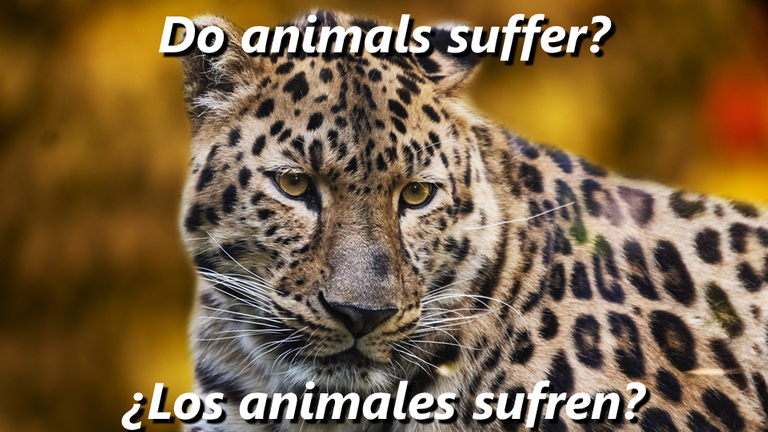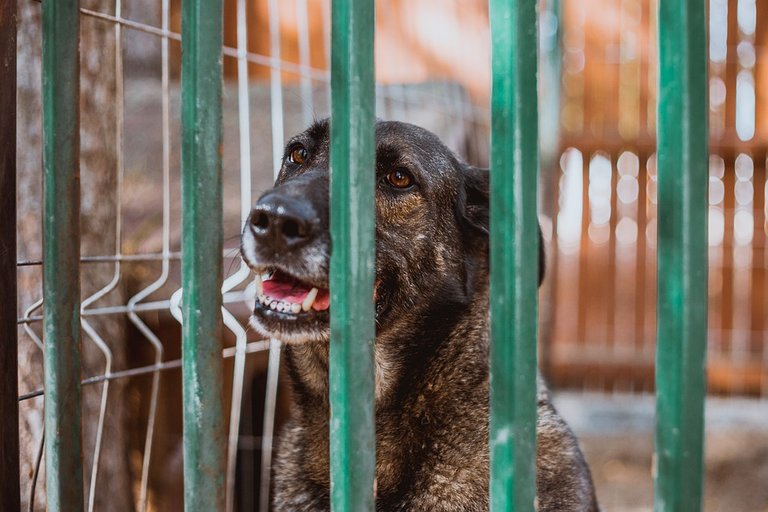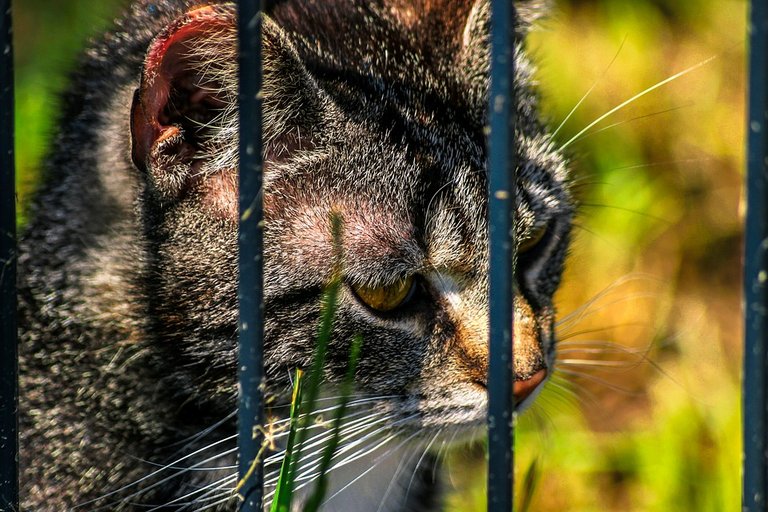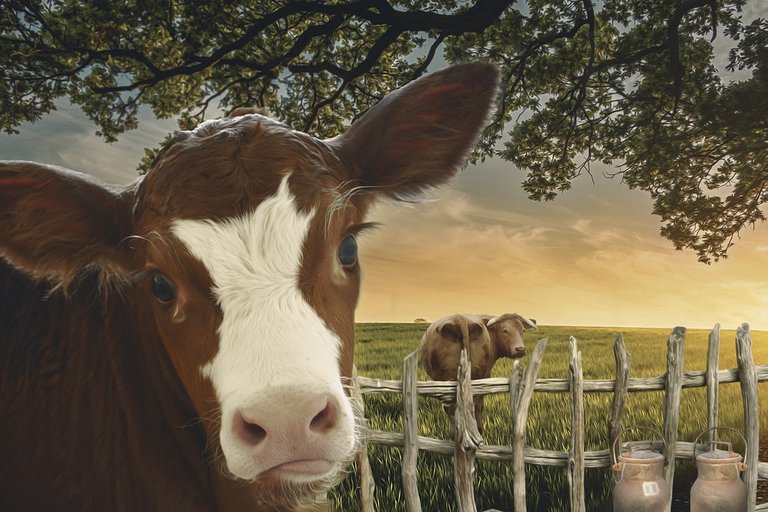Animals are more "machines-like" than we are? — ¿Son los animales más "máquinas" que nosotros?
A few weeks ago I came across a very interesting post from @agmoore that was talking about animals. He asked himself the question, Do animals suffer? The post was specifically dedicated to certain insects such as scorpions and spiders, and it spoke of the fact that it cannot yet be scientifically proven whether or not these animals could feel suffering or anguish.
But at the same time it led to the reflection of consider the possibility that these animals (or any animal) could feel or suffer, and treat them with due consideration.
Unas semanas atrás me topé con un post muy interesante de @agmoore que hablaba acerca de los animales. Se hacía la pregunta ¿Los animales sufren? El post era dedicado específicamente a ciertos insectos como escorpiones y arañas, y hablaba de que aún no se puede demostrar científicamente si estos animales podían sentir o no sufrimiento o angustia.
Pero al mismo tiempo se llevaba a la reflexión de considerar la posibilidad de que estos animales (o cualquier animal) pudieran sentir o sufrir, y tratarlos con la debida consideración.

The title of this post might sound inappropriate for animal advocates. But I'm not really trying to say that animals are machines that don't feel, but that to some degree, they might be more machine-like than we humans.
You could say that animals they are less aware of time, and of the laws of cause and effect. Humans observe the rain and can begin to reason or intellectualize where the rain comes from, either through myths or through science.
Animals, on the other hand, do not seem to have this same level of intellect than us. Perhaps some have it to some degree, as in primates. Animals tend to act mostly by instinct, by "automatic reflexes" that help them preserve their physical integrity.
El título de este post podría sonar inapropiado para los defensores de los animales. Pero en realidad no trato de decir que los animales sean máquinas que no sienten, sino que en cierto grado, pudieran ser más parecidos a las máquinas que nosotros los seres humanos.
Podría decirse que los animales son menos conscientes del tiempo, y de las leyes de causa-efecto. Los seres humanos observamos la lluvia y podemos empezar a razonar o intelectualizar de donde proviene la lluvia, ya sea mediante mitos o mediante la ciencia.
Los animales, en cambio, no parecen tener este mismo nivel de intelecto que nosotros. Quizás algunos lo tengan en cierto grado, como en los primates. Los animales suelen actuar mayormente por instintos, por "reflejos automáticos" que les ayudan a preservar su integridad física.

Animals seem to be "programmed" to behave in a certain way, they have behaviors that help them survive and reproduce. But I think that no animal is interested or capable of finding out the origin of the phenomena that occur around it, its interest is usually to adapt, react to these phenomena for its self-preservation.
Los Human beings have a greater awareness of the laws of cause and effect in time. We know that there are things that hurt or are uncomfortable but that are good for us. Animals run away from pain, because it is what their instinct says, but they do not know that such pain may mean something good, such as when you take your dog or cat to the vet.
Los animales parecen estar "programados" para comportarse de cierta manera, tienen comportamientos que les ayudan a sobrevivir y reproducirse. Pero creo que ningún animal le interesa o es capaz de averiguar el origen de los fenómenos que ocurren a su alrededor, su interés suele ser adaptarse, reaccionar a dichos fenómenos para su auto-preservación.
Los seres humanos tenemos una mayor consciencia de las leyes de causa-efecto en el tiempo. Sabemos que hay cosas que duelen o son incómodas pero que nos hacen bien. Los animales huyen ante el dolor, porque es lo que su instinto dice, pero no saben que dicho dolor quizás signifique algo bueno, como por ejemplo cuando llevas a tu perro o gato al veterinario.

This ability to be self-aware and to be able to go a little beyond our primitive instincts is what differentiates us from animals. Perhaps being aware that later we may die is what makes us feel that fear or suffering. And we could relate this to "having a soul" and feeling emotions, being able to be something more than just meat. But do animals also suffer or "have souls"?
Evidently suffering can be seen in some animals, especially in mammals. This suffering could be compared more to the suffering of a human child than that of an adult person. But do all animals suffer? What about insects or reptiles? This question cannot be answered, but perhaps such suffering is less "conscious".
I have also heard that animals do not die but rather "perish", that is, they do not know that they die. I cannot tell if this is true.
Esta capacidad de ser auto-conscientes y poder ir un poco más allá de nuestros instintos primitivos es lo que nos diferencia de los animales. Quizás estar conscientes de que más adelante podemos morir es lo que nos hace sentir ese miedo o sufrimiento. Y esto lo podríamos relacionar a "tener alma" y sentir emociones, ser capaces de ser algo más que solo carne. Pero ¿Los animales también sufren o "tienen alma"?
Evidentemente en algunos animales se puede ver sufrimiento, especialmente en los mamíferos. Este sufrimiento podría compararse más al sufrimiento de un niño humano que al de una persona adulta. Pero ¿Todos los animales sufren? ¿Qué hay de los insectos o reptiles? No se puede responder a esta pregunta, pero quizás dicho sufrimiento sea menos "consciente".
También he escuchado que los animales no mueren sino que "fenecen", es decir, no saben que mueren. No sabría decir si esto es cierto.

The philosopher Descartes considered that animals were mechanical beings without a soul and therefore could not feel, have thought or intelligence. I think very few people today would agree with Descartes here. According to Descartes, there was no difference between animal or machine, animals move "according to the needs of their organs."
In my opinion, animals do have souls and can suffer, at least to some degree. Could we position animals as an intermediate between machines and human beings? The truth is that from a certain point of view, animals are more machines than human beings, because they are more "programmed" by instincts, while in humans there is greater self-awareness and the ability to "get off the script", see beyond.
We understand by machine as something that does not have its own consciousness and acts by physical laws or by some externally imposed programming. Animals in a way have similarities, but they go a little further, and humans even more.
El filósofo Descartes consideraba que los animales eran seres mecánicos sin alma y por lo tanto no podían sentir, tener pensamiento o inteligencia. Creo que muy pocas personas en la actualidad estarían de acuerdo con Descartes aquí. Según Descartes, no había diferencia entre animal o máquina, los animales se mueven "según las necesidades de sus órganos".
En mi opinión, los animales si tienen alma y pueden sufrir, al menos en cierto grado. ¿Podríamos situar a los animales como un intermedio entre las máquinas y los seres humanos? Lo cierto es que desde cierto punto de vista, los animales son más máquinas que los seres humanos, porque están más "programados" por instintos, mientras que en los humanos hay mayor auto-consciencia y capacidad para "salirse del guión", ver más allá.
Entendemos por máquina como algo que no tiene consciencia propia y actúa por leyes físicas o por alguna programación impuesta externamente. Los animales en cierta forma tienen similitudes, pero van un poco más allá, y los humanos aún más.

It could be said that the "intelligence of the body" is like a machine, seeking its self-preservation by basic instincts that evolved over millions of years. And the human being is the one who gets the most out of this "programming". Can this be made an analogy with the movie MATRIX ...?
Human beings are also susceptible to being "programmed" by our environment, society, family, culture, etc., without our realizing it or being aware of it, but I think it would be something more complex than in animals.
Podría decirse que la "inteligencia del cuerpo" es como una máquina, que busca su auto-preservación por instintos básicos que evolucionaron por millones de años. Y el ser humano es el que más se sale de esa "programación". ¿Se puede hacer una analogía de esto con la película MATRIX...?
Los seres humanos también somos susceptibles de ser "programados" por nuestro ambiente, la sociedad, la familia, la cultura, etc., sin que nos demos cuenta o seamos conscientes de ello, pero creo que sería ya algo más complejo que en los animales.
In conclusion, the purpose of this post is to become aware that all animals could suffer too, and that they are an important part of the natural balance. But at the same time becoming aware that as human beings, by being more aware, we have greater responsibility.
En conclusión, la finalidad de este post es tomar consciencia de que todos los animales podrían sufrir también, y que son parte importante del equilibrio natural. Pero al mismo tiempo tomar consciencia de que como seres humanos, al ser más conscientes, tenemos mayor responsabilidad.
Translated to English language with the help of DeepL.com
| ¡Gracias por visitar! — ¡Thanks for visiting!  |
https://twitter.com/acontcivil/status/1480976626737455111
The rewards earned on this comment will go directly to the person sharing the post on Twitter as long as they are registered with @poshtoken. Sign up at https://hiveposh.com.
I was reminded of the photograph of a monkey breastfeeding its cub, hours before its death, even though it was shot. Surely the mother monkey was in pain.
I'm sure animals can suffer, you can seen it when your dog or cat is sick, or in the example you mention. However, that suffering could be some how different to human, yet, it is suffering. Thanks for passing by, best regards.
Saludos @acont, interesante entrada que has publicado. Me hiciste recordar dos entradas que publiqué en 2020 relacionadas con la moral, la ética y el dolor, en una con énfasis en el dolor en animales no humanos. Sigo pensando que todos los animales experimentan dolor y algunos de distinta forma por medio de expresiones que no son tan obvias.
Saludos @capp oye creo que recuerdo uno de ellos, que de hecho yo lo comenté.
Es un tema interesante pero que sin duda debemos considerar que ellos también sufren porque son seres vivos. Gracias por comentar, saludos.
There are studies that show animals display grief. What does this tell us? Nothing, because we cannot communicate. However, should our inability to fathom an animal's consciousness (awareness) be a license to assume that consciousness (awareness) does not exist? I think not. It's certainly convenient to default to that belief. But any philosophy or morality premised on convenience is suspect.
If we cannot know the extent of an animal's awareness, then we must behave as though it exists. To do otherwise would be to risk inflicting great suffering. That you and I would not do.
Me parece bastante interesante tu punto de vista y sin duda un tema que me gustaría profundizar a nivel de bioética. Yo creo que el hombre tiene poder sobre los animales y parte del raciocinio es saber elegir que acciones son positivas y que acciones son negativas.
Yo veo como parte del ciclo alimenticio algo normal consumir carne, huevos, lácteos, aprovechar ese alimento que brindan los animales. Pero también me gusta compartir con mi perrita y obviamente no la mataría para comérmela. Sin embargo, si se me acerca un zancudo a zumbarme el oído sí. Entonces existe una clasificación que el hombre ha creado sobre los animales: cuáles son comida, cuáles son para acompañarnos, cuáles hay que eliminar porque son una plaga. No es posible meterlos a todos en un mismo saco.